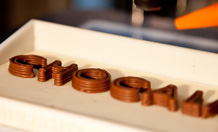
CHOCALM - Chocolate additive layer manufacturing
University of Exeter announces spin out company for 3D chocolate printing
Following a huge amount of interest in the potential for personalised 3D chocolate, Dr Liang Hao from the University of Exeter has founded Choc Edge Ltd, a company which will develop and sell its unique 3D chocolate printers to the world.
Based at the University’s Innovation Centre, the new company will open its doors at the end of April. Choc Edge will then be accepting pre-orders for its printers and aims to sell between 500 and 1,000 machines over the next three years.
3D printing, or additive layer manufacturing, is a modern fabrication process that can use a wide range of materials to create products ranging from medical implants to parts of an aircraft wing. Three dimensional parts are built up in two-dimensional layers as little as 0.05 mm thick; this way of building parts offers great flexibility and opportunities for creating new products at low cost, whilst reducing the carbon footprint associated with manufacturing. Objects can be ‘printed’ in 3D by simply entering an image into the machine.
The University of Exeter engineers were the first to develop a way of applying 3D printing to chocolate, which is a challenging material to work with because it requires accurate control of viscosity and temperature conditions. Dr Hao explains “It is a very exciting moment for us to be able to offer a totally unique product to companies across the globe. The initial worldwide interest in creative and bespoke 3D chocolate products was enormous, so we hope the demand for the printers will also be high. By next Easter, consumers will be able to order their own, personalised Easter eggs along with many other chocolate gifts.”
Prices for tailored, on-demand made chocolate products will vary, from a few pounds for small, individual items up to more than a thousand pounds for larger, artistic creations. Choc Edge Ltd will continue to be involved in designing and proto-typing new and different chocolate shapes to inspire its customers, but will pass orders onto its clients that have purchased one of the printers.
Business Secretary Vince Cable said "British researchers are once again leading the way turning science into a fun and marketable product with great export potential. The development of chocolate printing is a good example of how backing Britain's scientists delivers jobs, boosts export receipts and helps to rebalance our economy."
The original research that led to the making of the first 3D chocolate printer was supported by a grant award from the Engineering and Physical Sciences Research Council (EPSRC).
For more information and links to videos showing 3D chocolate printing, please visit the Chocedge website from 9 April.
Date: 7 April 2012
